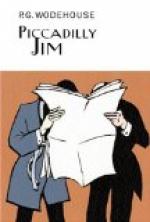Far different was the attitude of Mrs. Crocker’s sister, Nesta Pett. She entirely disapproved of the proposed match. At least, the fact that in her final interview with her sister she described the bridegroom-to-be as a wretched mummer, a despicable fortune-hunter, a broken-down tramp, and a sneaking, grafting confidence-trickster lends colour to the supposition that she was not a warm supporter of it. She agreed wholeheartedly with Mrs. Crocker’s suggestion that they should never speak to each other again as long as they lived: and it was immediately after this that the latter removed husband Bingley, step-son Jimmy, and all her other goods and chattels to London, where they had remained ever since. Whenever Mrs. Crocker spoke of America now, it was in tones of the deepest dislike and contempt. Her friends were English, and every year more exclusively of England’s aristocracy. She intended to become a leading figure in London Society, and already her progress had been astonishing. She knew the right people, lived in the right square, said the right things, and thought the right thoughts: and in the Spring of her third year had succeeded in curing Bingley of his habit of beginning his remarks with the words “Say, lemme tell ya something.” Her progress, in short, was beginning to assume the aspect of a walk-over.
Against her complete contentment and satisfaction only one thing militated. That was the behaviour of her step-son, Jimmy.
It was of Jimmy that she spoke when, having hung the receiver on its hook, she returned to the breakfast-room. Bayliss had silently withdrawn, and Mr. Crocker was sitting in sombre silence at the table.
“A most fortunate thing has happened, Bingley,” she said. “It was most kind of dear Lady Corstorphine to ring me up. It seems that her nephew, Lord Percy Whipple, is back in England. He has been in Ireland for the past three years, on the staff of the Lord Lieutenant, and only arrived in London yesterday afternoon. Lady Corstorphine has promised to arrange a meeting between him and James. I particularly want them to be friends.”
“Eugenia,” said Mr. Crocker in a hollow voice, “do you know they call baseball Rounders over here, and children play it with a soft ball?”
“James is becoming a serious problem. It is absolutely necessary that he should make friends with the right kind of young men.”
“And a racquet,” said Mr. Crocker.
“Please listen to what I am saying, Bingley. I am talking about James. There is a crude American strain in him which seems to grow worse instead of better. I was lunching with the Delafields at the Carlton yesterday, and there, only a few tables away, was James with an impossible young man in appalling clothes. It was outrageous that James should have been seen in public at all with such a person. The man had a broken nose and talked through it. He was saying in a loud voice that made everybody turn round something about his left-scissors hook—whatever that may have been. I discovered later that he was a low professional pugilist from New York—a man named Spike Dillon, I think Captain Wroxton said. And Jimmy was giving him lunch—at the Carlton!”




